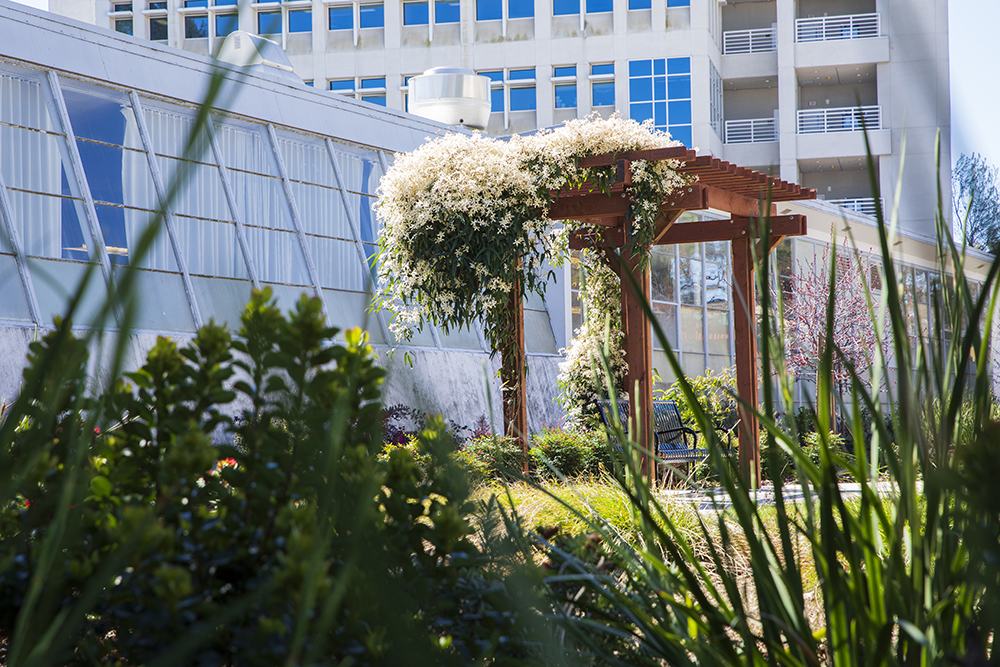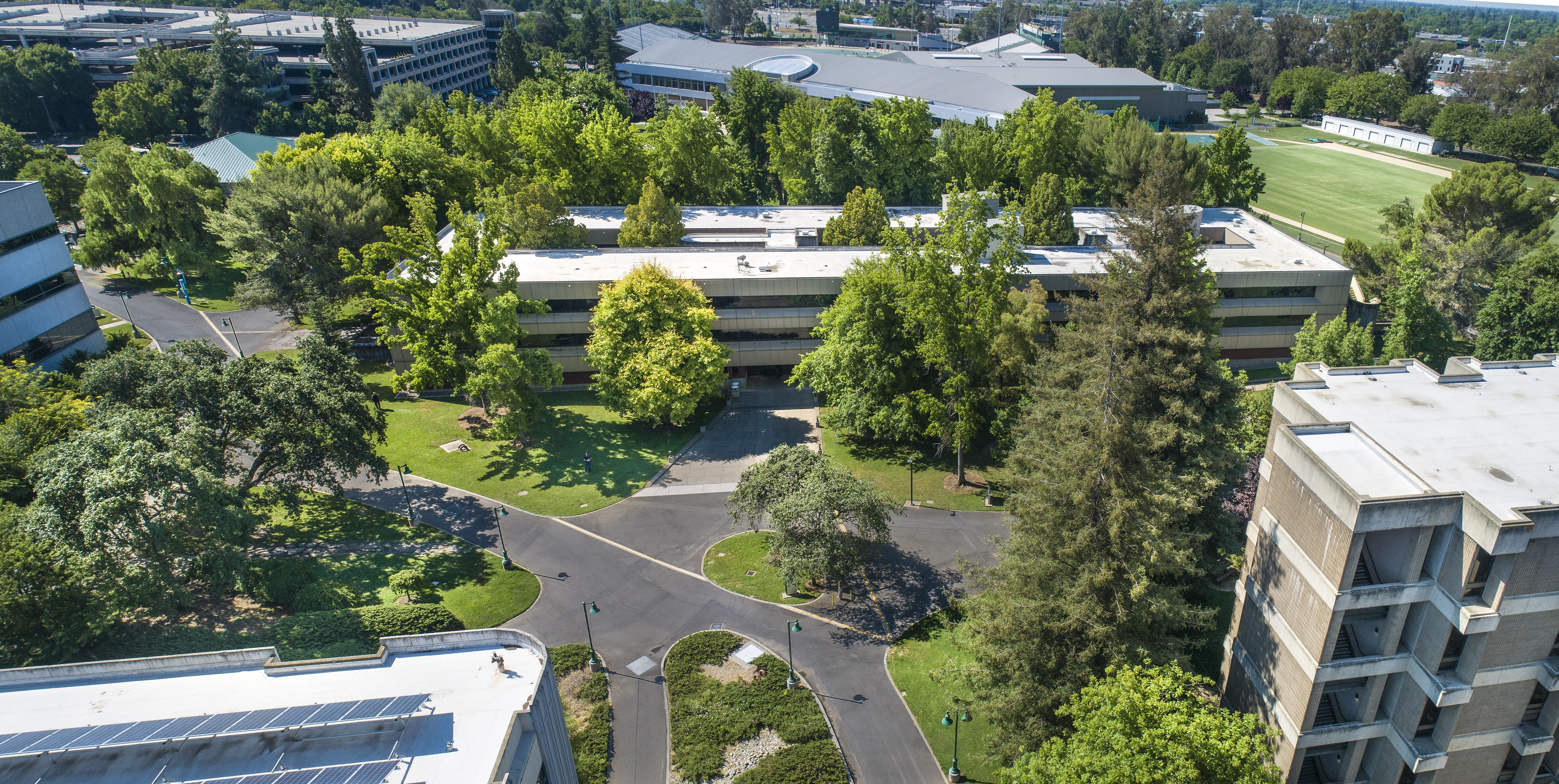 Sac State's campus is relatively empty, but the mission of delivering education goes on as adjustments are made to deal with fallout from the coronavirus. (Sacramento State/Hrach Avetisyan
Sac State's campus is relatively empty, but the mission of delivering education goes on as adjustments are made to deal with fallout from the coronavirus. (Sacramento State/Hrach Avetisyan
By Cynthia Hubert
At a time of extraordinary stress amid concerns about the coronavirus, Sacramento State is taking steps to help students navigate their studies and lives.
With much of the campus closed until further notice to help curb spread of the virus, classes and services have shifted to online delivery, and the University’s staff is moving to virtual operations.
For hundreds of students, the task of continuing to pursue their degrees was complicated by the fact that they were without laptop or home computers and internet services.
 Across the University, efforts to support students through various initiatives continues. (Sacramento State/Andrea Price)
Across the University, efforts to support students through various initiatives continues. (Sacramento State/Andrea Price)Even before the widespread campus closures, Sac State leaders began taking action to ensure that the academic year move forward. They also launched a variety of online programs to answer pressing questions about the COVID-19 virus and its impact on campus, and to help students deal with anxiety and stress associated with a multitude of changes.
Related story: Coping with virus fallout, students get help from Sac State
“This is all new for many of our students, and some may have difficulty adapting to it,” said James Dragna, the University’s executive director for Graduation Initiatives and Student Success. “We want to help them address and manage the stress associated with the crisis.”
One of the University’s first steps was to make sure that all students had access to computers and internet services necessary for them to continue their courses.
A “flash poll” of 30,000 students found that about 2 percent of them would be without a computer with a keyboard while off campus, and 6 percent without Internet services.
“Early on, we had a suspicion that we might have to support remote operations, so we started pounding the pavement trying to identify and buy computers,” said Mark Hendricks, interim vice president and chief information officer for the division of Information Resources & Technology. The technology team also began pursuing WiFi hotspots, headsets and webcams that students and faculty members could use to continue courses with as little disruption as possible, he said.
The University is now allowing those items to be borrowed for free at least through the end of the semester. More than 500 computers had been distributed as of Wednesday, Hendricks said.
Students interested in the lending program should contact their professors, who will then work with the IRT Service Desk, he said.
Sac State faculty members who want to conduct visual online meetings with their students are receiving training from the Academic Technology Team on Zoom and other platforms, Hendricks said.
Students, staff and faculty members seem to be coping well so far with their disrupted schedules and formats, he said.
“Everyone has been appreciative and considerate,” Hendricks said. “Our team has been working so hard under very difficult circumstances. We’re making the best of a bad situation. There’s a lot of uncertainty, but we are doing our best and people seem to understand that.”
In addition to computer tools and equipment, the University is supporting students with online access to counseling and other services. They can access both medical and mental health care through The WELL, but should contact their private providers if they require complicated treatment, administrators said.
Academic advising also has moved to an online format, Director Miesha Williams said.
Students can go to the department’s website to schedule an appointment with an advisor, who then will meet with them via Zoom, Skype or telephone, she said. The department also is answering individual emailed questions.
Among other online services available to students are peer mentoring, support for foster youth, group tutoring sessions and social connections through programs including the MLK Center, the First Generation Institute and Project Hmong, said Marcellene Watson-Derbigny, associate vice president for Student Retention and Academic Success.
“While we know there is much to traverse during this time, our goal is to support the Division of Student Affairs and the University as a whole to help our students achieve success,” she said.
So far, “most students seem to be doing OK,” Williams said. “A lot of students are going home, and others are more focused on just getting through the semester.
“We’re not seeing an unusual amount of traffic, though we are getting some unusual questions,” many of them having nothing to do with academic advising, Williams said. Her office is forwarding such questions to the appropriate departments, she said.
“This is not normally our busy season. We haven’t hit our peak,” said Williams. She said her office is bracing for many more questions and concerns as finals approach.
Dragna, who is a psychologist, said he worries about Sac State students who were struggling even before the virus upended campus life. The University intends to conduct follow-up polling about their needs, he said.
“The University is in a position to be able to offer directives,” Dragna said. “We also are offering a connection; another way to reach out and get a good understanding of the campus climate and how our students are doing overall.”
The routines of campus life help many students juggle their responsibilities, he said.
“Some choose to be in a university environment because they prefer face-to-face interactions and campus structure,” Dragna said. “Some may not do as well if they’re not here. We want to know what is happening with them and what we can do to help.”
Many Sac State students have pressures beyond academics, including families who count on them and financial concerns, he said.
Dragna recommended several strategies for reducing stress, including taking advantage of online counseling and keeping tabs on the most-reliable information about the virus, its impacts and available resources.
“One of the best ways to relieve stress and anxiety is to really understand the facts,” he said. President Robert S. Nelsen and his cabinet members are frequently updating students and answering questions on Sac State’s website, Dragna said.
“The administration is distributing this information as it evolves, and being as clear as possible about decisions that are being made,” Dragna said. “With the proper information, all of us have the ability to make choices that will help us understand what is going on and release anxiety as well.”
Nelsen praised the efforts of the campus community to keep students on track during “troubling times.”
“We are all facing unimaginable disruption in our daily lives,” he said. “Our students, especially those who are on track to graduate this spring, don’t know what’s ahead of them.” Circumstances are changing rapidly, he said, and “we are all facing the unknown.”
Yet, “I have seen more creative problem-solving in the past few days than I have seen throughout my entire career,” he said. “I am proud of our faculty and staff, but most importantly, I am proud of our students.
“We will get past this crisis together as a Hornet family.”
